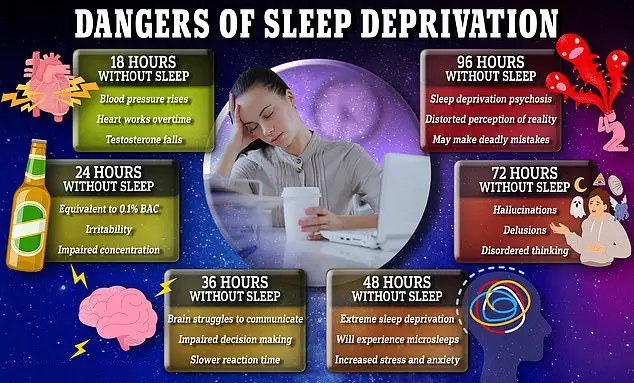
Warning over common over-the-counter drug that can fuel cancer in warm weather
It is crucial for individuals taking these medications to be aware of the potential risks and to take appropriate steps to protect their skin from harmful UV radiation.
For years, health experts have been advocating the importance of eating five portions of fruits and vegetables each day. This advice has been promoted in public health campaigns and is regularly emphasized in nutrition guidelines to prevent chronic diseases such as heart disease and cancer. However, new research from US scientists suggests that adhering to this well-known dietary recommendation might do more than just protect against physical illnesses. In fact, it could potentially reduce the risk of insomnia within just 24 hours, offering a natural, cost-effective way to improve sleep quality.
This study highlights the growing understanding of how our diet directly affects sleep patterns and the importance of nutrition in maintaining overall well-being. Experts have now started to recognize that making simple dietary adjustments can have a profound impact on sleep, sometimes even in as little as one day. In this article, we’ll explore the research findings, the impact of diet on sleep quality, and why incorporating more fruits and vegetables into your daily meals could be the key to better rest.
The Importance of Diet in Sleep Quality
The connection between diet and sleep is not new, but the recent findings from the University of Chicago’s study have brought this relationship into sharper focus. Dr. Esra Tasali, an expert in sleep medicine and the study’s co-author, remarked on the significance of their results, stating, “It’s remarkable that such a meaningful change could be observed within less than 24 hours.” This study examined the eating habits of young adults and found that a simple increase in the daily intake of fruits and vegetables could significantly enhance sleep quality, reducing the likelihood of sleep fragmentation and promoting better overall rest.
Eating five fruit and vegetables each day, designed to stave off heart disease and cancer, has stood for more than two decades and is highlighted regularly in public health campaigns
Sleep deprivation can lead to obesity, memory loss, diabetes, heart disease, heightened and unstable emotions, impaired ability to learn and a reduced immune response, leaving you vulnerable to disease
But how does this work? The answer lies in the gut microbiome-the community of bacteria that resides in our digestive system. Research has shown that fiber-rich foods like fruits and vegetables promote the growth of beneficial gut bacteria, which in turn influence the production of sleep-regulating neurotransmitters, such as serotonin and melatonin. These compounds play a critical role in regulating the sleep-wake cycle, making the gut microbiome an essential player in achieving restorative sleep.
The Study: Tracking the Link Between Diet and Sleep
The study, published in Sleep Health, tracked the diet and sleep patterns of 34 healthy young adults, with an average age of 28. Over the course of the study, participants reported their daily food intake using an app, while researchers monitored their sleep with a wristband that measured sleep quality. The primary focus was on sleep fragmentation, a measure of how often participants woke up or shifted from deep to light sleep throughout the night.
The results were striking. Participants who consumed at least five cups of fruits and vegetables per day showed a 16% improvement in sleep quality compared to those who did not eat any fruits or vegetables. This improvement was primarily due to a decrease in sleep fragmentation, which is linked to deeper and more restorative sleep cycles.
In the study, scientists tracked the eating habits of 34 healthy young adults, aged 28 on average. They reported their daily food consumption using an app and wore a wrist monitor that allowed the researchers to objectively measure their sleep patterns

The 'five-a-day' is the the five daily portions of fruit and vegetables that the NHS recommends is needed to keep us healthy
Dr. Tasali emphasized the significance of the 16% improvement, saying, “Sixteen percent is a highly significant difference.” The findings underscore the potential of dietary changes as a natural, effective way to improve sleep. “Dietary modifications could be a new, natural, and cost-effective approach to achieve better sleep,” Dr. Tasali added, highlighting the potential of simple changes in our eating habits to make a meaningful impact on our health.
The Role of Healthy Carbohydrates in Sleep Improvement
In addition to fruits and vegetables, the study also found that individuals who consumed healthier carbohydrates, such as whole grains, experienced better sleep quality. This finding aligns with previous research showing that diets rich in complex carbohydrates can help regulate blood sugar levels, which in turn helps maintain stable energy levels throughout the night.
By opting for whole grains like oats, quinoa, and brown rice, rather than refined carbohydrates like white bread and pasta, individuals may be able to improve their sleep by stabilizing their blood sugar and avoiding spikes and crashes that can disrupt the sleep cycle.
The Dangers of a Poor Diet for Sleep
While incorporating fruits, vegetables, and whole grains into your diet can improve sleep, the reverse is also true. A poor diet, high in processed and unhealthy foods, can disrupt sleep patterns and lead to a range of sleep disorders, including insomnia. Dr. Tasali and other experts have pointed out that the modern diet, which is often high in processed foods, sugar, and unhealthy fats, can have a negative impact on sleep. This diet can lead to increased inflammation, disrupted gut health, and imbalances in neurotransmitter levels-all of which can contribute to poor sleep.
In particular, foods like red and processed meats, which are high in saturated fats, have been linked to sleep disturbances. These types of foods can alter the gut microbiome, increase inflammation, and negatively affect sleep quality. Dr. Tasali’s research highlights the importance of avoiding processed foods, especially those high in added sugars and unhealthy fats, to ensure that the body is not predisposed to sleep disorders.
The Growing Concern of Insomnia Among Young People
Insomnia, which is defined as difficulty falling or staying asleep at least three nights a week for more than three months, is a growing concern worldwide. In the UK alone, over five million people suffer from chronic insomnia, and research shows that the incidence of sleep disorders is rising, particularly among younger people. Studies have found that the number of young people experiencing sleep problems has increased significantly in recent years, with stress, poor lifestyle habits, and unhealthy diets playing a role.
A 2022 survey by The Sleep Charity found that one in six Brits suffer from insomnia, and 65% of those affected do not seek help for their condition. The rise in sleep disorders among young people has raised alarms, as poor sleep is linked to a range of health problems, including obesity, heart disease, stroke, diabetes, and even cancer. In fact, chronic sleep deprivation can lead to increased irritability, reduced focus, and impaired cognitive function in the short term, while long-term lack of sleep can contribute to serious health issues, including cardiovascular disease and metabolic disorders.
Given the growing prevalence of insomnia, it is more important than ever to find effective, natural ways to address the root causes of poor sleep. Dr. Tasali’s research suggests that dietary modifications, particularly increasing the intake of fruits, vegetables, and whole grains, could be an essential step in combating the rising tide of sleep disorders.
Dietary Modifications: A Natural Solution for Better Sleep
The connection between diet and sleep is clear: a healthy, balanced diet is key to achieving good sleep. Dr. Marie-Pierre St-Onge, a nutrition scientist at Columbia University and study co-author, also stressed the importance of making small changes to one’s diet. “Small changes can impact sleep. That is empowering - better rest is within your control.” These findings empower individuals to take charge of their sleep health by making simple adjustments to their eating habits.
By consuming a diet rich in fiber, vitamins, and minerals from fruits, vegetables, and whole grains, individuals can support their gut health, stabilize blood sugar levels, and promote the production of sleep-regulating neurotransmitters like serotonin and melatonin. These changes can lead to better sleep, improved mood, and enhanced overall health.
The Growing Popularity of Diets for Sleep Improvement
In light of Dr. Tasali’s findings and the increasing awareness of the connection between diet and sleep, many health experts are recommending that individuals take a closer look at their eating habits. In addition to consuming more fruits and vegetables, experts like Professor Tim Spector, founder of the Zoe nutrition app, have advocated for more diverse plant-based diets, recommending 30 different types of plants each week to promote gut health and overall well-being.
While the NHS has long recommended the five-a-day rule for fruits and vegetables, it’s becoming increasingly clear that this may not go far enough to optimize health. Studies have suggested that doubling the intake to 10 servings of fruits and vegetables each day may offer the most significant health benefits. However, the rising cost of fresh produce and the convenience of processed foods make it more challenging for people to meet these recommendations.
Eating Your Way to Better Sleep
Incorporating more fruits, vegetables, and whole grains into your diet could be the key to improving your sleep quality and reducing the risk of insomnia. Dr. Tasali’s research has shown that small dietary changes-such as increasing your intake of fiber-rich foods-can lead to a 16% improvement in sleep quality in as little as one day. This study underscores the importance of nutrition in achieving better sleep and highlights the powerful role that diet plays in regulating sleep patterns.
For those struggling with sleep issues, the solution may be simpler than they think. Instead of relying on sleep aids or medications, individuals may be able to improve their sleep naturally by making small, sustainable changes to their diet. By focusing on foods that promote gut health and regulate neurotransmitters, you can take control of your sleep health and enjoy more restful nights.

It is crucial for individuals taking these medications to be aware of the potential risks and to take appropriate steps to protect their skin from harmful UV radiation.

With the rising temperatures and the potential for bacteria growth in the heat, it’s essential to adjust your food storage practices to ensure your meals remain safe and enjoyable.

While protein shakes have become a staple for many individuals looking to maintain muscle mass or lose weight, recent research suggests that these seemingly innocent supplements may pose significant risks to long-term health.



While many of these foods may be considered indulgent or "fancy," the risks they pose are very real and can have life-threatening consequences.













A groundbreaking app, Circadian AI, developed by a 14-year-old, uses machine learning to analyze heart sounds and detect early signs of heart disease with 96% accuracy in just seven seconds.

Mary's inspiring story of overcoming a turbulent childhood, discovering her roots, and finding love and happiness. A tale of resilience, self-discovery, and the power of family.

At 100, Layne Horwich faced bre@st canc3r with bravery. Learn how her active lifestyle, strong will, and a decision to undergo surgery helped her beat canc3r and inspire others to prioritize their health.

Inspired by Sandra Bullock's profound wisdom, this piece explores the power of choosing peace over retaliation. Learn how empathy, silent strength, and the courage to move forward define true resilience and foster personal growth in the face of disrespect

Mason Wartman’s Rosa’s Fresh Pizza turned $1 slices into a kindness movement. Read his story! ❤️🍕

Discover the history and beauty of Hàng Trống paintings, one of Vietnam's three most iconic folk art traditions. Learn about its cultural significance and lasting impact, showcased through the eyes of an artisan at work.

Ada Blackjack survived alone in the Arctic for two years, a forgotten hero. Discover her incredible story! ❤️❄️

Found tied up and heartbroken, one dog's life changed forever. Discover his journey from abandonment to a loving home, a powerful story of rescue, unconditional love, and the profound joy of giving a second chance to a deserving soul.

Discover the incredible journey of a family from hardship to success. From being placed in a Catholic orphanage to serving in WWII, this family's resilience and love for each other became their strength.

It is crucial for individuals taking these medications to be aware of the potential risks and to take appropriate steps to protect their skin from harmful UV radiation.

A wealthy father goes undercover as a poor man to test the sincerity of his son’s fiancée and her wealthy parents. Tension builds as the family tries to humiliate him, but an unexpected revelation leaves everyone speechless.

After being unfairly blamed for a mess at the office, Valya finds an unexpected ally in her office rival, Marianna. Together, they confront the CEO, and Valya learns the power of standing up for herself. A story of empowerment, confrontation, and self-wor

Lonely pensioner, Brenda, has spent most of her life providing shelter cats with a forever home. When her newest pet, Lucky, starts bringing home dollar bills, Wendy quickly realizes something suspicious is happening in her neighborhood.

With the rising temperatures and the potential for bacteria growth in the heat, it’s essential to adjust your food storage practices to ensure your meals remain safe and enjoyable.

While protein shakes have become a staple for many individuals looking to maintain muscle mass or lose weight, recent research suggests that these seemingly innocent supplements may pose significant risks to long-term health.



A strange sound from the bathroom on a cross-country flight gives flight attendant Lenna a terrible fright. Little does she realize that the kid inside will forever change her life.

While many of these foods may be considered indulgent or "fancy," the risks they pose are very real and can have life-threatening consequences.
